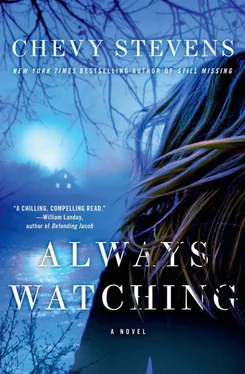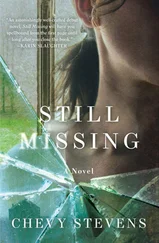Michelle said, “Everything happened so fast—after I found her. I just saw the blood. It was awful.” Her voice changed from a frantic, shocked tone to a hushed and eerie resolve. “I’m never going in that room again.”
* * *
As soon as I got off the phone with Michelle, I pulled on some clothes and rushed to the hospital, where the nurses were trying to calm the patients down. Michelle was sitting in the nurses’ station, pale and shaking, as another nurse handed her a mug of tea. Until the coroner had finished his initial investigation, Heather’s body was still in the utility room. Noticing that the door had been left ajar, and not wanting anyone to peer inside, I went to close it. Before I got it shut all the way, my eyes were assaulted with the brutal image of Heather’s body on the floor, her back still leaning against the wall, and her thin, pale legs and arms all akimbo, like a broken doll. Her face was to the side, so all I could see was her hair. Thick, red blood pooled around her wrists, a bucket was kicked over by her feet, and there were smears of blood over her nightgown.
Then my eyes were drawn to the wall above her head. Written unevenly in blood were the words: He’s watching.
I quickly closed the door.
* * *
The coroner was already interviewing everyone, including me. I sat through his questions, numb, my mind spinning. How had this happened? There’d be an inquest and a quality care assurance, as there always is when there’s a death on the floor. I would have to call MCAP, my insurance provider, and they’d advise me on what to say and how to say it. There’d also be group grief-counseling sessions in the coming days, but I didn’t care about any of that right now.
All I could think was: How am I going to tell Daniel? I would rather have done it in person, but I couldn’t risk Daniel arriving in the morning before anyone had a chance to tell him. There was still too much chaos on the ward, so I walked over to my office at Mental Health, delaying for a few more moments. Then I sat at my desk, staring at a photo of Lisa, thinking that at least Heather’s parents were spared this call, feeling sad that so much tragedy had befallen one family. I couldn’t stop going over my last conversations with Heather. What had I missed? Was I clouded by my own feelings about the commune? Should I have referred her to someone else? I remembered seeing the utility door unlocked weeks before, remembered thinking I should mention it to one of the nurses. But I’d been so upset after hearing Aaron’s name that I forgot.
If I’d said something, she might still be alive.
Finally, I looked up Daniel’s number, took a deep breath, and made the call. As I dialed, I realized my hand was shaking.
His voice was husky from sleep but also tinged with fear. He must’ve seen the hospital name on his call display.
“Hello, Daniel, this is Dr. Lavoie…. I…” I was at a loss for words, my head aching and close to tears myself. How was I ever going to tell him that his wife had died? I had assured him she was safe— assured him.
“Dr. Lavoie?” Daniel sounded more alarmed. “Is everything okay?”
“I’m calling to talk about your wife.” I had to say this as gently and as swiftly as possible. “There was an incident on the ward tonight, and Heather was found unresponsive. We tried to revive her, but it was too late. We don’t know the exact cause of death, but it appears to be self-inflicted. I want you to know that we tried everything we could to save her.”
There was a sharp intake of breath on the other end, like he was strangling for air.
“I don’t understand. What happened?” His mind was grasping, spin wheeling. The weight of my words hadn’t hit home yet.
“We’ll know more when the coroner finishes his investigation.” I took a breath and steadied myself. I didn’t like that I couldn’t give him details, but the potential for a lawsuit was too high. The hospital would appoint someone to handle all future communications.
“How did she die?” His voice was horrified, shocked.
My mind filled with visceral images of Heather, writhing in agony on the floor, clawing at her throat. Her esophagus burning.
“I’m sorry. I don’t have that information right now.”
“I just don’t understand. I saw her this morning. She was better than she’d been in days—she kept telling me how much she loved me.”
His tone was heartbroken confusion. The mind tries to reason, to find a justification: One plus one equals two. I did the same after Paul’s diagnosis. He just had to eat right, get chemo, and think positive. He would beat cancer. But life doesn’t work like that. Good men die before their time, and patients, despite getting our best care, still find a way to destroy themselves.
“Yes, she did seem to be doing better.” I didn’t have the heart to tell him that it’s when suicidal patients start feeling better that they sometimes complete the process—they now had the energy to follow through. Even though she’d told me that she wasn’t thinking of hurting herself, she’d likely had a plan for a while and was just waiting for an opportunity. She’d been so convincing, and seemed so genuine, but I regretted believing her. I thought about how desperate she must have been to choose such a painful way to die.
I flashed to an image of her face the last time I saw her, the wistful smile. You’re a good doctor. Was she trying to make sure I didn’t blame myself for what she was about to do? I also thought about Kevin, how she had thanked him that day. Even her loving words to Daniel could now be interpreted as a good-bye.
Daniel’s voice turned hard and accusing. “You said she was safe—you promised that nothing would happen to her.”
Anger and blame were the next steps. I had expected it, but I still felt the blow, ached with my own guilt and regrets.
“I realize this has been an incredible shock, and you’re upset—”
“Upset? My wife just died —when you were supposed to be watching her.”
I chose my words carefully, struggling with my need to comfort him and my need to protect the hospital. “I’m truly sorry for your loss. Someone will be in touch with you soon. They’ll help you with the next part of the process.”
I was glad I didn’t have to go through it step by step with him, didn’t want to brush past her death and move on to the particulars: picking up her personal belongings, her remains. My eyes stung when I thought of everything he was going to have to face in the coming days. “You shouldn’t be alone right now. Is there someone you’d like me to call for you?”
This time there was no anger in his voice. He just sounded hollow and defeated as he said, “Heather was all I had.” Then he hung up.
The next few days were a blur, but I needed to be on the ward, with the support of the team, all of us still reeling from the tragedy. We had a couple of group counseling sessions, most of the nurses breaking down at one point. A few times I came close as well. The young woman whose room was next to Heather’s was having a particularly bad time. Jodi suffered from anorexia and was extremely underweight, below ninety pounds. She had to have meal support, where a nurse sat and ate lunch with her. Heather had befriended Jodi and also sat with her at meals. Now Jodi was refusing to eat again.
The staff who saw the scene in the utility room were also struggling. One nurse mentioned having nightmares about all the blood from when Heather had cut her wrists, and I flashed to an image of Heather’s writing on the wall: He’s watching. The moment I first saw the words was still burned in my own mind—the streaks of red, the violent shock to the eyes. I’d been so upset by Heather’s death I hadn’t had a chance to think about the meaning of them. Now a quick snapshot of a memory came rolling out of the dark: Aaron at one of the late-night teaching sessions, the smell of a campfire, his voice raised in a fervent warning: The Light sees everything we do. He’s always watching over us. What had he been talking about? I calmed my mind, tuned out the voices around me, concentrated on that moment. Then, with a stab of fear, a sharper memory came into focus.
Читать дальше












